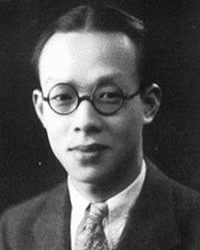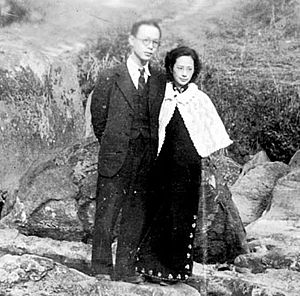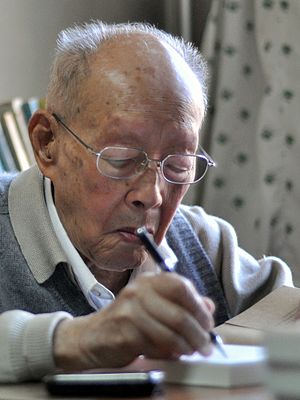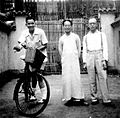Zhou Youguang facts for kids
Quick facts for kids
Zhou Youguang
|
|||||||||||
|---|---|---|---|---|---|---|---|---|---|---|---|
| 周有光 | |||||||||||

Zhou in the 1920s
|
|||||||||||
| Born |
Chou Yao-ping
13 January 1906 Changchow, Kiangsu, Qing Empire
|
||||||||||
| Died | 14 January 2017 (aged 111) |
||||||||||
| Alma mater | St. John's University Guanghua University |
||||||||||
| Known for | Development of Pinyin; supercentenarian | ||||||||||
|
Notable work
|
The Historical Evolution of Chinese Languages and Scripts | ||||||||||
| Political party | China Democratic National Construction Association | ||||||||||
| Spouse(s) |
Zhang Yunhe
(m. 1933; |
||||||||||
| Children | 2 | ||||||||||
| Chinese name | |||||||||||
| Chinese | 周有光 | ||||||||||
|
|||||||||||
| Birth name | |||||||||||
| Chinese | 周耀平 | ||||||||||
|
|||||||||||
Zhou Youguang (Chinese: 周有光; pinyin: Zhōu Yǒuguāng) was a very important Chinese expert in many fields. He was born on January 13, 1906, and lived to be 111 years old, passing away on January 14, 2017. He was known as the "father of Pinyin".
Pinyin is a special system that uses the Roman alphabet (like the letters we use in English) to write down the sounds of Mandarin Chinese. This system was officially adopted by the Chinese government in 1958. It was also recognized by the International Organization for Standardization (ISO) in 1982 and the United Nations in 1986.
Contents
Early Life and Education
Zhou Youguang was born as Zhou Yaoping in Changzhou, Jiangsu Province, China. His father was a government official during the Qing dynasty. When he was ten, his family moved to Suzhou.
In 1918, Zhou started high school in Changzhou. This is where he first became interested in linguistics, which is the study of language. He finished high school with honors in 1923.
That same year, Zhou began studying at St. John's University, Shanghai. He focused on economics but also took classes in linguistics. His family was poor, so friends and relatives helped him pay for his studies. In 1925, he moved to Guanghua University and graduated in 1927.
On April 30, 1933, Zhou married Zhang Yunhe. They went to Japan so Zhou could continue his studies. He first attended the University of Tokyo and then Kyoto University. Their son, Zhou Xiaoping, was born in 1934. They also had a daughter, Zhou Xiaohe.
Life During Wartime
In 1937, the Second Sino-Japanese War began. Zhou and his family had to move to Chongqing, which was the wartime capital. Sadly, his daughter passed away during this time.
Zhou worked for a bank called Sin Hua Bank. Later, he worked for the government's Ministry of Economic Affairs. After World War II ended in 1945, Zhou went back to work for Sin Hua Bank. He worked for them overseas in New York City and London. While in New York, he even met the famous scientist Albert Einstein twice!
After the People's Republic of China was founded in 1949, Zhou returned to Shanghai. He taught economics at Fudan University for several years.
Creating Pinyin
Zhou Youguang was friends with Zhou Enlai, a very important leader in China. Zhou Enlai remembered Zhou Youguang's interest in languages and asked him to come to Beijing in 1955. He gave Zhou Youguang a big task: to lead a team to create a new way to write Chinese. The goal was to help more people learn to read and write, making it easier for everyone to communicate.
Zhou's team was in charge of developing a system to write Chinese sounds using the Roman alphabet. This system became known as Pinyin. Zhou said it took about three years of full-time work to create Pinyin. In 1958, Pinyin became the official way to show how Chinese characters are pronounced. It was a guide for pronunciation, not a replacement for Chinese characters themselves.
Zhou's team based Pinyin on older systems. The sounds were inspired by systems like Gwoyeu Romatzyh and Latinxua Sin Wenz. The special marks that show the tones (how your voice goes up or down when you say a word) were inspired by Zhuyin.
In 1979, Zhou Youguang presented the "Hanyu Pinyin System" to an international conference in Warsaw. He suggested it should be the worldwide standard for writing Chinese sounds. In 1982, after a vote, Pinyin officially became an international standard called ISO 7098. Today, Pinyin is used all over the world and has mostly replaced older systems like Wade-Giles.
Later Years and Legacy
During a difficult time in China called the Cultural Revolution, Zhou Youguang, like many other smart people, was sent to the countryside. He spent two years in a labor camp, where he had to do physical work. This was a way to "reeducate" intellectuals.
After 1980, Zhou worked on translating the Encyclopædia Britannica into Chinese. This big project earned him the nickname "Encyclopedia Zhou." Even after creating Pinyin, Zhou kept writing and publishing books. After he turned 100, he published ten more books! Some of his books were not allowed to be sold in China.
In 2011, Zhou Youguang said in an interview that he hoped China would change its mind about the Tiananmen Square events of 1989. He believed this event had harmed the reputation of a leader named Deng Xiaoping. Zhou became a supporter of political reform and democracy in China. He also criticized the Communist Party for harming traditional Chinese culture when they came to power.
In 2013, Dr. Adeline Yen Mah visited Zhou and his son in Beijing. She made a video of their visit and showed Zhou a Pinyin game she created for the iPad.
Zhou Youguang became a supercentenarian on January 13, 2016, when he turned 110 years old. He passed away at his home in Beijing on January 14, 2017, just one day after his 111th birthday. His wife had passed away in 2002, and his son in 2015.
On what would have been his 112th birthday, Google honored him with a special animated version of its logo, called a Google Doodle.
Images for kids
-
Zhou (right) posing with writer Shen Congwen (center) and Gu Chuanjie (Template:W:zh:顧傳玠) (left) in 1946
See also
 In Spanish: Zhou Youguang para niños
In Spanish: Zhou Youguang para niños
- Yuen Ren Chao
- List of centenarians (educators, school administrators, social scientists and linguists)
 | Percy Lavon Julian |
 | Katherine Johnson |
 | George Washington Carver |
 | Annie Easley |









